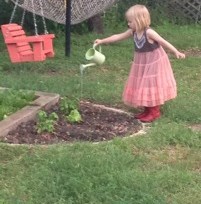Julia’s Garden reopens on an urban farm oasis
/
In this guest post from Katherine Parlette, you’ll learn about Julia’s Garden, a Montessori program in the heart of Travis Heights where young people will have the opportunity to grow and thrive right alongside the garden plants they tend.
Welcome to Julia’s Garden! Or, for some of you, welcome back. This year, with the construction of our first Children’s House, we are concentrating on a nature-based Montessori curriculum. The home space we will be teaching the classes from is an urban farmland conveniently located in South Central Austin. It’s a place where city kids can benefit from getting their hands dirty, seeing the process of where and how their food is grown, and helping harvest, prepare, and serve it in their very own “house.”
Children who are coming into their third and fourth years of life are in their sensitive periods for reading and writing. Many programs offer a chance to explore nature, exposure to languages, and music and/or arts and crafts activities. Although all of these things are important for the preschooler and are also part of our curriculum, what sets us apart is our AMI-trained Guides, who have the time, resources, and expertise to sit down with your three-year-old and make sure that lessons are offered at the exact point in the child’s development when he or she is ready to receive it. It’s this accountability for academic learning that makes us different from many other home-based programs.
Julia’s Garden classes will be held in the sacred space of a private home, which, through years of teaching in various environments, we have found to be young children’s preferred kind of space for absorbing knowledge. Traditional school buildings in commercial settings are not ideal places for small children to spend their formative years. Vinyl flooring, fluorescent lights, and limited outside time all go against the child’s natural tendencies to learn through their senses and through movement. Plastic toys, unbreakable dishes, and padding send the message that children are clumsy and not to be trusted.
In contrast, AMI Montessori environments are lovingly prepared with materials that are pleasing to touch and to see. The Children’s House, or “Casa de Bambini,” as Dr. Maria Montessori called her first classroom, is a true home for children where they can work, play, and take ownership of their environment. Having access to materials made from nature, like wood and wool, show respect for young children and in turn help them develop respect for and knowledge about nature. Items made of ceramic and glass help children learn balance, patience, and responsibility. The result of this approach is a confident and capable child.
 In our backyard, where nature leads the way, children are able to develop concrete language and fine motor skills literally from the ground up. In a garden classroom, touch, taste, smell, and sound allow them to fully take in the world around them. Harvesting their own ingredients teaches respect for food, and learning the process by which it arrives at our table helps avoid future battles around nutrition and eating disorders in the teenage years.
In our backyard, where nature leads the way, children are able to develop concrete language and fine motor skills literally from the ground up. In a garden classroom, touch, taste, smell, and sound allow them to fully take in the world around them. Harvesting their own ingredients teaches respect for food, and learning the process by which it arrives at our table helps avoid future battles around nutrition and eating disorders in the teenage years.
Gardening also builds important life and survival skills that will assist in your child’s development all the way into her adult years. In the fall, the children will have the opportunity to harvest the summer crop and prepare snacks made from organic ingredients. Simultaneously, they will be preparing the winter garden. We will talk about which vegetables and fruits grow best in our climate in the winter months and choose our favorites as a class. Then we will plant them together and continue to water them and weed the garden in order to truly see how an organic garden grows. Composting is also a big part of our daily regime: all food we do not consume goes into the compost bin so that children see the importance of recycling and that nothing goes to waste.
Julia’s Garden is a community-based class program. We encourage parents to help us in the garden and form adult friendships. Montessori is a family, and the mixed ages give the children opportunities to be teachers as well as students. We bring children into our Primary classroom before age 3 so that they can remain with the same teacher for a longer stretch of time. Having fewer transitions to work through during this tender time means more space for growing and learning in the environment. It also means that there are no delays in the child’s education from toileting training setbacks. By starting children at school in the midst of their process, we can help them to become successful at independent toileting well before their third birthday.
There’s a lot “growing on” at Julia’s Garden in 2014! Come and see for yourself or visit our website. We hope to see you soon!
Katherine Parlette, AMI M.Ed.









